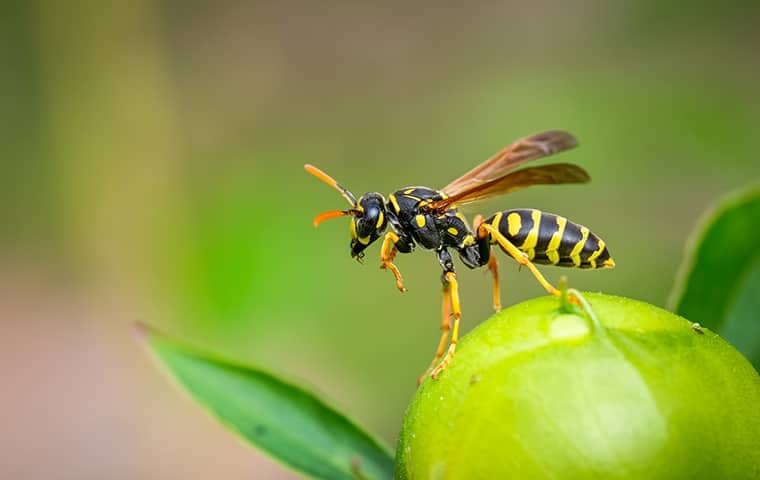
Your Ultimate Plan To Get Rid of Wasps & Hornets In Charlotte
How much do you know about wasps and hornets? Do you know why they chose your property or why they made nests? Do you know how different wasps behave and why they come back year after year? Join us today as we look at all the facts you need for wasp prevention and control. As always, your Go-Forth Home Services service team is here should you need assistance with a wasp problem. We are your local area wasp exterminators in Charlotte.

How Are Hornets And Wasps Different?
When Charlotte residents see a stinging insect, they may call it many things, even if what they call it is not the proper name for it. Some common names of insects come from what most people call them. So, when determining the difference between bees, wasps, and hornets, things can get a bit confusing, but perhaps a little less confusing when it comes to bees. If you see a fuzzy insect flying around in your yard, it is likely a bee. Its fuzzy appearance makes it distinctly different, even though some still refer to wasps and hornets as bees.
Things get trickier when differentiating wasps and hornets from each other. First, all hornets are wasps. If you see an actual hornet on your property, you're also looking at a wasp. But if you call a wasp a hornet, you're likely wrong. There is only one proper hornet in the United States. It is the Eastern European hornet or the brown hornet. A brown hornet is brown with yellowish and orange stripes. It has a dull appearance overall and a pale face. At full size, a brown hornet can reach 1 1/2 inches in length.
We also have another pest with the "hornet" name, but it is not a proper hornet. The common name for this species stuck because people used it when referencing them. It is the bald-faced hornet. While large, it isn't nearly as big as a brown hornet. Adults are between 5/8 and 3/4 of an inch. They are black with white or yellow stripes.
At the end of the day, it doesn't really matter how hornets are different from wasps. They both make aerial nests or protected nests inside voids, depending on the species, feed on nectar and protein, and both can be large insects. The cicada killer can be as large as a European wasp.
Now that you know a bit about stinging pests that come into your yard, let's zero in on what attracts wasps to your property. If you know why they're hanging out and why they might want to make a nest, you can take steps to keep them away.
What Attracts Hornets And Wasps?
Various things attract the different kinds of wasps in Charlotte. While there is no real difference between hornets and wasps, there are differences between species. The primary distinction between wasp species is whether or not they make aerial nests or hidden nests in voids:
- Wasps that create aerial nests require wood pulp. They get this material from logs, stumps, firewood, and other sources of wood.
- Wasps that create ground nests require holes. Most wasps are not diggers. They utilize holes that already exist.
- Wasps that build nests inside structural voids require an entry point. If your home has a drooping eave or a piece of buckling siding, these insects may take notice.
- All wasps eat nectar. They love that sweet food source because it gives them energy and tastes great. They'll also eat a sweet nutrient the larvae produce inside the nest. A property with lots of flowering weeds is attractive to wasps.
- Wasps collect bugs to bring back to the nest to feed the larvae. Any bug with protein is up for grabs—that means all of them. A property with lots of pests will draw wasps.
- Wasps eat human food, so they may show up at picnics and backyard cookouts. They'll also show up after you finish eating; a property with food left out after outdoor dining can attract wasps.
- Wasps aren't picky about what they eat. They'll feed from a trash receptacle, and the scent of trash attracts them. If you see a nest forming on your roofline above an exterior trash receptacle, the smell may have inspired them to create that nest up there.
- Wasps need moisture and will drink from puddles and other water sources. You may attract wasps if you have a clogged gutter or a moisture problem.
- Wasps love sweet liquids. Juice cups left out on the back porch or the liquid in a hummingbird feeder can make wasps want to live near, in, or on your home.
If your property has any of these attractants, you may invite a wasp problem. There are ways you can counteract these natural attractants. Let's look at practical ways to deter hornets and wasps by making a few changes.
Practical Ways To Deter Hornets And Wasps From Your Property
Wasps will choose any property for hardly any reason. They create nests underneath overhangs, on exterior walls, inside small structural cavities, and in the ground. But you can make your property less attractive than other properties. Doing so will repel wasps naturally. No self-respecting wasps wants to live in a place where food and moisture are limited. Therefore, these are the places to start with your wasp prevention:
- Reduce exterior light to reduce insect populations. Insects are attracted to light. You may also replace white light with yellow because insects can detect yellow light and are not attracted to it.
- Remove spider webs and crush spider egg sacs to reduce the number of spiders. Wasps feed on these bugs and have a preference for them.
- Rake leaves and remove other organic material to deter moisture pests. Many bugs hide underneath organic debris where it is moist.
- Trim vegetation, remove weeds, and keep your landscaping open and dry. Damp plants can become unhealthy plants, and unhealthy plants attract plant-damaging insects.
- Clean your gutter and repair downspouts. Your gutters collect the rainwater that runs down your roofs in torrents. If they're not working properly, your perimeter soil can get drenched and provide puddles for wasps and other pests to use as a drinking hole.
- Keep your trash in covered containers and avoid overfilling, which can prop lids open. Make sure to clean your receptacles if they smell a bit ripe. That scent is off-putting to you but attractive to wasps.
- Move trash receptacles away from your exterior. Doing this will prevent the smell from rising to your roofline.
- Pick up wood and store it in a covered bin. When you protect wood, you keep wasps from using it to make their paper-like nests.
Clean up around cookout areas and outdoor dining spaces. This one is self-explanatory. - Fill in ground holes with dirt or pea stones. Wasps aren't going to dig a hole themselves unless they're cicada killer wasps. But cicada killer wasps are a different pest problem. They are considered lawn pests because of their ability to excavate soil and damage grass. They present less of a stinging hazard because they are solitary wasps.
- Avoid putting down too much mulch so pests don't dig in it and create protected voids for yellow jackets. It doesn't take much of a cavity for yellow jackets (or bumble bees) to make nests.
- Remove anything in your yard that has a sweet aroma. If it smells like a flower, it can attract stinging pests.
Simple steps like this can make wasps turn up their noses at your property—if they had noses. Now that you know how to repel wasps, let's turn our attention to wasp nest detection and removal. These are the bread and butter of wasp control.
Call Us For Effective Hornet And Wasp Control
Early detection of nests and proper removal can mitigate the threat of wasp stings. The primary reason for wasp stings has to do with nest protection. When wasps are away from their nests, they present hardly any threat to people. In fact, it is good to have wasps visit your property because they help with pollination and pest control.
Issues begin when these insects create their nests. Social wasps have a nest protection instinct. When a threat is detected, the drones release a pheromone that inspires the swarming behavior. When wasps gather into a swarm, they mean business, and each wasp can sting several times.
It is essential to do routine inspections around the exterior of your home, particularly in spring and early summer. But life gets busy, and it is easy to put regular inspections on the back shelf. That is one reason it pays to contact Go-Forth Home Services for ongoing pest control service that includes routine inspections and targeted wasp nest removal. We address wasp problems early and quickly so that you can relax in your yard, front porch, back porch, and around the pool.
Spend time in your yard doing the things you want to do rather than trying to figure out where wasps are hiding and what to do about them when you find them. Reach out to Go-Forth Home Services today to speak with one of our friendly service team members.
Do you live in Charlotte? Contact us and ask us about professional home pest control and yard maintenance for your home. We can create a year-round service plan that meets your specific needs. If you want professional pest control for hornets and wasps, we'll put that right into your plan, and you can put it right out of your mind.
Customer Reviews
-
“He spent time educating us about "pests" and provided information regarding services with GoForth.”- Joyce C.
-
“Texted me before coming. Worked with me playing musical rooms with my dogs. I'll see how things are.”- Constance E.
-
“Amazing response time, reasonable prices, great customer service. Tevin was thorough and confident in his plan to fix our horrendous fire ant problem. We have had negative experiences with prior exterminators and probably waited way too long to call Go-For”- Ashley T.
-
“- Toya B.
We have been customers for almost 7 years for a reason. Our technician is the best. He always knows exactly how to address whatever pest has decided to bother us. We have referred them to many of our neighbors. Well worth the cost not to have to worry a
” -
“Answered all my questions and I felt their pricing was very reasonable.”- Deborah J.
-
“Brian went above and beyond what was expected, and I hope I get him again as my technician for future services!”- Tam L.
-
“He was thorough with inspecting and treating our home, which I really appreciate, and he took the time to answer my many questions.”- Jasmine B.
-
“Love the detailed summary and pics of what he did and saw! And did I mention how wonderful Olivia was to get us all set up?!!”- Beechy A.


Over the years, we’ve boiled down our mission to a core set of values:
-
The Best & Highest ReviewsBBB A+ Rated and 4.8 or higher on Google and Facebook for the highest rated local company in the Triad.
-
Seven North Carolina Technicians of the YearHome of the 2009, 2010, 2012, 2013, 2014, 2015, & 2016 statewide technicians of the year.
-
A+ Rating with Better Business BureauBBB Accredited since 1973 for 48 years of continuous accreditation.
-
Serving North Carolina, South Carolina, Georgia, & Virginia
With six locations and dozens of technicians in the field every day, we service areas of North & South Carolina, Georgia, and Virginia.
-
Residential & Commercial ServiceResidential and commercial clients in Greensboro, NC and beyond can attest - Go-Forth provides only the very best in home services.
-
4.9 Star Google Review Rating Across Three StatesGo-Forth Home Services is proud to have thousands of Google reviews with an average rating of 4.9 stars!